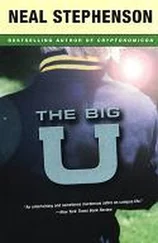Neal Stephenson - The Confusion
Здесь есть возможность читать онлайн «Neal Stephenson - The Confusion» весь текст электронной книги совершенно бесплатно (целиком полную версию без сокращений). В некоторых случаях можно слушать аудио, скачать через торрент в формате fb2 и присутствует краткое содержание. Жанр: Альтернативная история, Фэнтези, на французском языке. Описание произведения, (предисловие) а так же отзывы посетителей доступны на портале библиотеки ЛибКат.
- Название:The Confusion
- Автор:
- Жанр:
- Год:неизвестен
- ISBN:нет данных
- Рейтинг книги:4 / 5. Голосов: 1
-
Избранное:Добавить в избранное
- Отзывы:
-
Ваша оценка:
- 80
- 1
- 2
- 3
- 4
- 5
The Confusion: краткое содержание, описание и аннотация
Предлагаем к чтению аннотацию, описание, краткое содержание или предисловие (зависит от того, что написал сам автор книги «The Confusion»). Если вы не нашли необходимую информацию о книге — напишите в комментариях, мы постараемся отыскать её.
The Confusion — читать онлайн бесплатно полную книгу (весь текст) целиком
Ниже представлен текст книги, разбитый по страницам. Система сохранения места последней прочитанной страницы, позволяет с удобством читать онлайн бесплатно книгу «The Confusion», без необходимости каждый раз заново искать на чём Вы остановились. Поставьте закладку, и сможете в любой момент перейти на страницу, на которой закончили чтение.
Интервал:
Закладка:
Down in the street-if that word could even be used for a passage as strait as this one-there were no women. Of men there was a marvelous variety. The Janissaries who made up the ocak were easy to recognize-some had a Greek or Slavic appearance, but most had an Asiatic look about the eyes, and all went in splendid clothing: baggy pleated trousers, belted with a sash that supported all manner of pistols, scimitars, daggers, purses, tobacco-pouches, pipes, and even pocket-watches. Over a loose shirt, one or more fancy vests, used as a sort of display-case for ribbons of lace, gold pins, swatches of fine embroidery. A turban on the top, pointy-toed slippers below, sometimes a long cape thrown over the whole. Thus the ocak, who were afforded never so much respect by all who passed them in the street. Algiers was crowded with many other sorts: mostly the Moors and Berbers whose ancestors had lived here before the Turks had come to organize the place. These tended to wear long one-piece cloaks, or else raiments that were just many fathoms of fabric swirled round the body and held in place by clever tricks with pins and sashes. There was a smattering of Jews, always dressed in black, and quite a few Europeans wearing whatever had been fashionable in their homelands when they’d decided to turn Turk.
Some of these white men looked just as a la mode as the young gallants who’d made it their business to pester Eliza at the Maiden in Amsterdam, but too there was the occasional geezer tottering down a staircase in a neck-ruff, Pilgrim-hat, and van Dyck. “Jesus!” Jack exclaimed, observing one of the latter, “why are we slaves, and that old moth a respected citizen?”
The question only befuddled everyone except for the rope-headed African, who laughed and shook his head. “It is very dangerous to ask certain questions,” he said. “I should know.”
“Who’re you then, and how came you to speak better English than I?”
“I am named Dappa. I was-am-a linguist.”
“That means not a thing to me,” Jack said, “but as we are nothing more than a brace of slaves wandering around lost in a heathen citadel, I don’t suppose there’s any harm in hearing some sort of reasonably concise explanation.”
“In fact we are not lost at all, but taking the most direct route to our destination,” Dappa said. “But my story is a simple one-not like yours, Jack-and there will be more than enough time to relate it. All right then: every slave-port along the African coast must have a linguist-which signifies a man skilled in many tongues-or else how could the black slavers, who bring the stock out from the interior, make deals with the ships’ captains who drop anchor off-shore? For those slavers come from many different nations, all speaking different languages, and likewise the captains may be English, Dutch, French, Portuguese, Spanish, Arab, or what-have-you. It all depends on the outcomes of various European wars, of which we Africans never know anything until the castle at the river-head suddenly begins to fly a different flag.”
“Enough on that subject-I’ve fought in some of those wars.”
“Jack, I am from a town on the river that is called, by white men, the Niger. This is an easy place to live-food grows on trees. I could rhapsodize about it but I will refrain. Suffice it to say ’twas a Garden of Eden. Save for the Institution of Slavery, which had always been with us. For as many generations as our priests and elders can remember, Arabs would occasionally come up the great river in boats and trade us cloth, gold, and other goods for slaves-”
“But where’d the slaves come from, Dappa?”
“The question is apt. Prior to my time they mostly came from farther up the river, marching in columns, joined together by wooden yokes. And some persons of my town were made slaves because they could not pay their debts, or as punishment for crimes.”
“So you have bailiffs? Judges?”
“In my town the priests were very powerful, and did many of the things that bailiffs and judges do in your country.”
“When you say priests I don’t imagine you mean men in funny hats, prating in Latin-”
Dappa laughed. “When Arabs or Catholics came to convert us, we would hear them out and then invite them to get back into their boats and go home. No, we followed a traditional religion in my town, whose details I’ll spare you, save one: we had a famous oracle, which means-”
“I know, I’ve heard about ’em in plays.”
“Very well-then the only thing I need to tell you is that pilgrims would come to our town from many miles away to ask questions of the Aro priests who were the oracles in my town. Now: at about the same time that some Portuguese began coming up the river to convert us, others began coming to trade with us for slaves-which was unremarkable, being no different from what the Arabs had been doing forever. But gradually-too gradually for anyone to really see a difference in his lifetime-the prices that were offered for slaves rose higher, and the visits of the buyers came more frequently. Dutch and English and other sorts of white men came wanting ever more slaves. My town grew wealthy from this trade-the temples of the Aro priests shone with gold and silver, the slave-trains from upriver grew longer, and came more frequently. Even then, the supply was not equal to the demand. The priests who served as our judges began to pass the sentence of enslavement on more and more persons, for smaller and smaller offenses. They grew rich and haughty, the priests did, and were carried through the streets on gilded sedan-chairs. Yet this magnificence was viewed, by a certain type of African, as proof that these priests must be very powerful wizards and oracles. So, just as the slave-trains waxed, so did the crowds of pilgrims coming from all over the Niger Delta to have their illnesses healed, or to ask questions of the oracle.”
“Nothing we haven’t seen in Christendom,” Jack observed.
“Yes-the difference being that, after a time, the priests ran out of crimes, and slaves.”
“What do you mean, they ran out of crimes?”
“They reached a point, Jack, where they would punish every crime, no matter how trivial, with enslavement. And still there were not enough slaves to sell down the river. So they decreed that henceforth, any person who appeared before the Aro oracle and asked a stupid question would be immediately seized by the warriors who stood guard in the temple, and flung into slavery.”
“Hmmm…if stupid questions are as common in Africa as they are where I come from, that policy must’ve produced a flood of wretches!”
“It did-yet still the pilgrims flocked to our town.”
“Were you one of those pilgrims?”
“No, I was a fortunate boy-the son of an Aro priest. When I was very young, I talked all the time, so it was decided I would be a linguist. Thereafter, whenever a white or Arab trader came to our town, I would stay in his lodgings and try to learn what I could of his language. And when the missionaries came, too, I would pretend to be interested in their religions, so that I could learn their languages.”
“But how did you become a slave?”
“One time I traveled downriver to Bonny, which is the slave-fort at the mouth of the Niger. En route I passed many towns, and understood for the first time that mine was only one of many feeding slaves down the river. The Spanish missionary I was traveling with told me that Bonny was only one of scores of slave-depots up and down the coast of Africa. For the first time, then, I understood how enormous the slave trade was-and how evil. But since you are a slave yourself, Jack, and have expressed some dissatisfaction with your estate, I’ll not belabor this. I asked the Spanish missionary how such a thing could be justified, given that the religion of Europe is founded on brotherly love. The Spaniard replied that this had been a great controversy in the Church, and much debated-but that in the end, they justified it only by one thing: When white slavers bought them from black slavers, Africans were baptized, and so the good that was done to their immortal souls, in that instant, more than compensated for the evils done to their temporal bodies during the remainder of their lives. ‘Do you mean to tell me,’ I exclaimed, ‘that it would be against the law of God for an African who was already a Christian to be enslaved?’ ‘That is so,’ said the missionary. And so now I was filled with what you call zeal. I love this word. In my zeal I got on the next boat bound upriver-it was a Royal Africa Company longboat carrying pieces of India cloth to trade for slaves. When I reached my town I went straight to the temple and-how do you say it-‘jumped the queue’ of pilgrims, and went before the highest of the high Aro priests. He was a man I had known all my life-he had been a sort of uncle to me, and many times we had eaten from the same bowl. He was sitting there resplendent on his gold throne, with his lion-skin, all draped about with fat garlands of cowrie-shells, and in great excitement, I said ‘Do you realize that this evil could be brought to an end today? The law of the Christian Church states that once a man has been baptized it is unlawful to make him a slave!’ ‘What is your point-or, to put it another way, what is your question?’ asked the oracle. ‘It is very simple,’ I said, ‘why don’t we simply baptize everyone in the whole town-for these Catholics make a specialty of mass baptisms-and furthermore why don’t we baptize every pilgrim and slave who walks into the city-gates?’ ”
Читать дальшеИнтервал:
Закладка:
Похожие книги на «The Confusion»
Представляем Вашему вниманию похожие книги на «The Confusion» списком для выбора. Мы отобрали схожую по названию и смыслу литературу в надежде предоставить читателям больше вариантов отыскать новые, интересные, ещё непрочитанные произведения.
Обсуждение, отзывы о книге «The Confusion» и просто собственные мнения читателей. Оставьте ваши комментарии, напишите, что Вы думаете о произведении, его смысле или главных героях. Укажите что конкретно понравилось, а что нет, и почему Вы так считаете.






